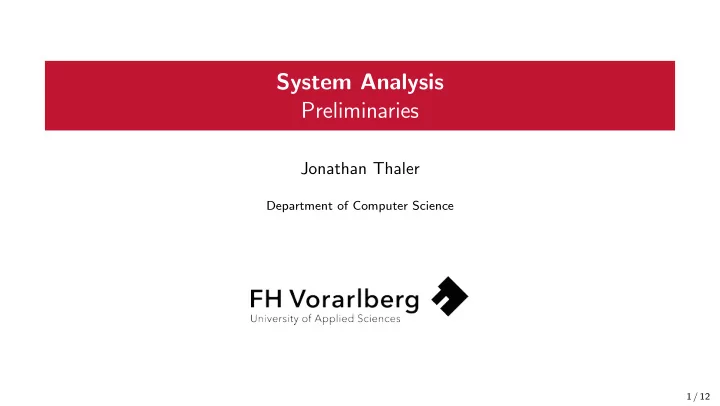

System Analysis Preliminaries Jonathan Thaler Department of Computer Science 1 / 12
Software Engineering Definition Software engineering is the systematic application of engi- neering approaches to the development of software . It is an intellectual product. It is not limited by physical laws (this is actually wrong, but lets not go there...). It is not subject to erosion (this is also wrong, but lets not go there...). It is easier to change than other products (this is also wrong...). It is easy to reproduce (wrong...). It does not have spare parts. Software has a complex lifecycle and it is difficult to grasp its requirements. 2 / 12
Software Engineering Software engineering is knowledgework therefore it involves some aspect of discovery , that is work that explores, evaluates, and confirms product options for potential delivery . As an engineering activity it is also craftwork and involves delivery , that is work that transforms one or more allocated candidate solutions into a releasable portion or version of the product . Key activities in software engineering are figuring out the right things to build and building the things right . 3 / 12
System Analysis Definition The discovery process of the right thing to build, to deliver the thing right, is the fundamental activity of System Analysis (also known as Requirements Engineering). Analysis is fundamentally about understanding . It is not about creating docu- mentation and specification as a mean in itself. In this course, System Analysis is understood as the fundamental activity to understand the customer and the domain . 4 / 12
Content Content Students learn how to derive analysis artifacts , related to each other with the main focus on modeling with various diagrams . We will focus on an agile approach and mindset instead of a heavy-weight plan- based fully documented approach. 5 / 12
Structure Lecture : 13 SWS in total Seminar : 15 SWS in total Written Exam : Monday 2nd Nov, 13:10 - 14:45 Assessment : Written Exam 70% + Scope Statement 30% Resources : Slides and Lecture Notes 1 1 https://homepages.fhv.at/thjo/lecturenotes/sysan/index.html 6 / 12
Lecture Background on Software Evolution, Plan vs. Agile, System Analysis Context Modeling Textual Analysis with Envisioning, User Stories, Use Cases Domain Modeling with UML Class Diagram Other Diagrams: State Machine, Activity, System Sequence Contracts 7 / 12
Seminar Exercises Standalone examples to practise analysis activities to produce artifacts which stand on their own and are not related to each other. The solutions and artifacts are discussed in class. Homework Develop a simple scope statement (Pflichtenheft) for a simple product vision a . This has to be developed in groups of 3 , either in the seminar if time permits and / or as homework. To be submitted by 2nd Nov 2020 13:10 (beginning of the written exam). a https://homepages.fhv.at/thjo/lecturenotes/sysan/product-vision-6.html 8 / 12
Content What this course is not about Scrum / Agile per se (see IT Product and Services Management ). Business and management side of requirements (see IT Product and Services Management ). UCT/HCI/GUI side of requirements (see Human-Centered Design ) Teaching analysis tools (UML, Story Boards,...). Producing comprehensive formal requirements specification. Software Engineering (see Innovation Project ). Modeling of a full system (see Modeling Cyber-Physical Systems ). 9 / 12
Corona Modalities Yellow Lecture and Red Orange Green exam on site . Lecture and Lecture and Alternative Lecture and written exam written exam lecture: online. written exam online . on site . Alternative online . exam: oral / written online. 10 / 12
Contact Jonathan Thaler Room No.: S2 21 Phone: +43 5572 792 3012 Mail: jonathan.thaler@fhv.at Website: https://homepages.fhv.at/thjo/ 11 / 12
Questions Any Questions? 12 / 12
Recommend
More recommend